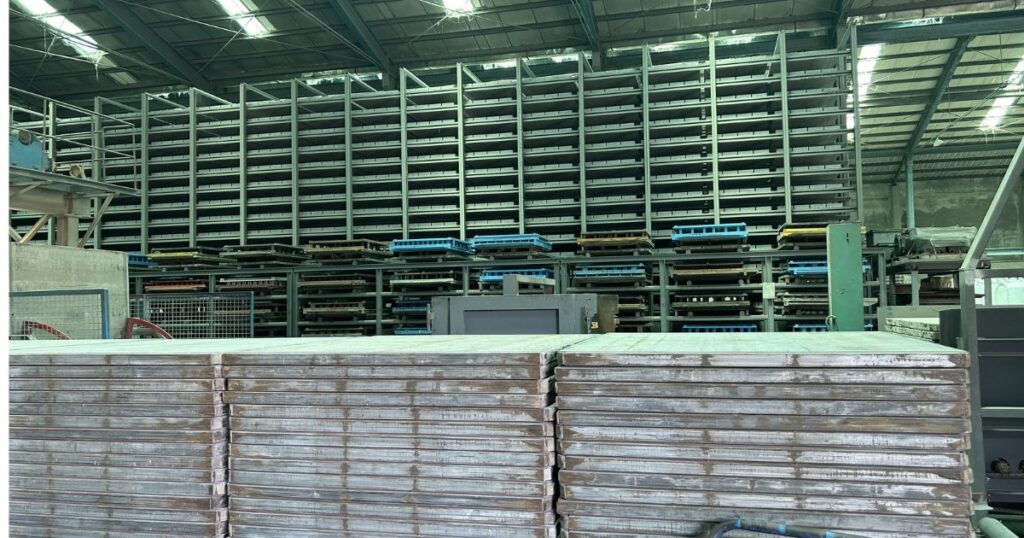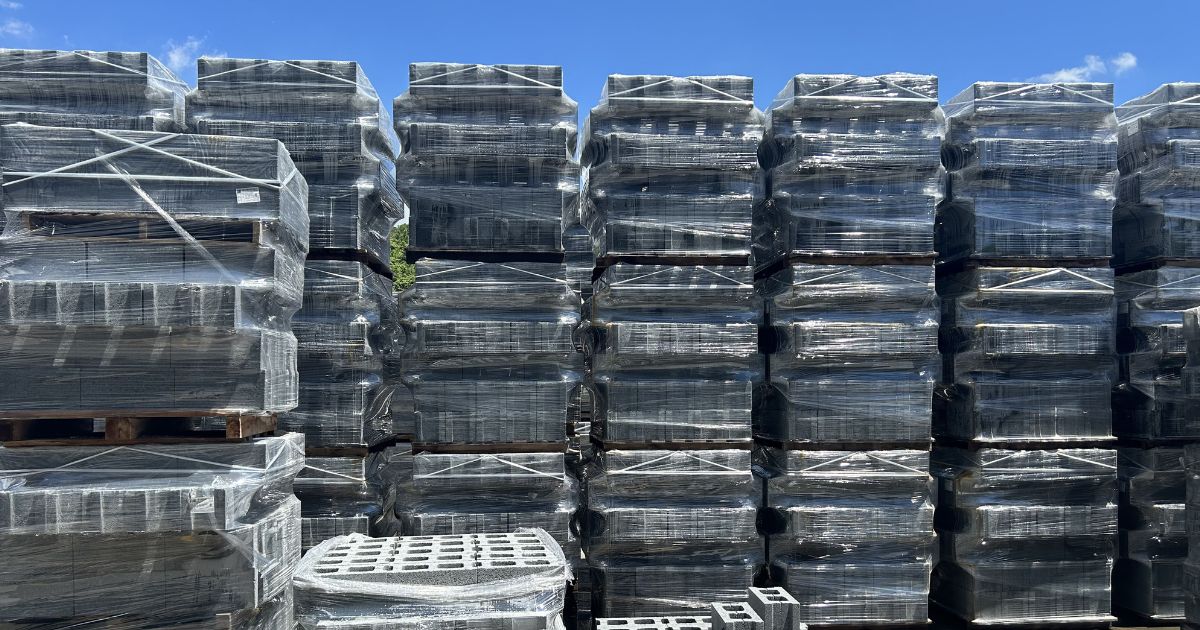Why an Automatic Brick Palletizing Machine is Important for Concrete Block Machines
- Home
- Why an Automatic Brick Palletizing Machine is Important for Concrete Block Machines
The world of manufacturing is constantly evolving, driven by technological advancements that enhance efficiency, safety, and product quality. One such innovation in the concrete block manufacturing industry is the automatic brick palletizing machine.
This machine plays a crucial role in the production process, streamlining operations, reducing labor costs, and improving the overall quality of the finished product.
In this blog, we’ll explore why an automatic brick palletizing machine is essential for concrete block machines, highlighting its benefits in efficiency, quality, cost-effectiveness, safety, and space optimization.
Additionally, we’ll touch upon the importance of using premium-quality pallets like Rhino Fabrico hardwood pallets, designed to protect your concrete blocks and improve the overall palletizing process.

What is an Automatic Brick Palletizing Machine?
Before diving into the benefits, it’s important to understand what an automatic brick palletizing machine is and how it works.
This machine is designed to automate the process of stacking concrete blocks onto pallets, which are then prepared for transport or storage.
In the past, this task was done manually, requiring workers to carefully stack the bricks, one by one, onto a pallet. This process was not only time-consuming but also prone to human error and injury.
An automatic brick palletizing machine, however, uses robotic arms, conveyors, and advanced sensors to automate the entire stacking process. The machine can efficiently place bricks in a predetermined pattern, optimizing space and ensuring uniformity.
It is typically integrated with the concrete block production line, receiving blocks directly from the curing system or molding machine and stacking them onto pallets without human intervention.
For even more efficiency, the use of high-quality pallets for brick production, such as Rhino Fabrico hardwood pallets, can enhance the durability and performance of the stacking process. These pallets are protected by resin-saturated interwoven industrial fabric, ensuring they can withstand the heavy weight of concrete blocks while maintaining their integrity over time.
1. Increased Efficiency in Production
One of the most significant advantages of an automatic brick palletizing machine is its ability to dramatically increase production efficiency. Automation in brick stacking eliminates the need for manual labor, reducing the time it takes to stack and organize the blocks. A skilled worker can only manually stack a limited number of bricks in a given period, whereas an automated palletizing machine can handle the task much faster, without sacrificing quality.
Moreover, an automatic palletizing system operates continuously, with minimal downtime. Unlike human workers who need breaks, the machine can run 24/7, maximizing output. In high-volume production environments, this continuous operation can lead to a significant boost in the number of concrete blocks produced within a given time frame.
The ability to quickly move pallets through the system also improves the speed of the overall production cycle. The faster the bricks are stacked, the sooner they can be moved to the next stage, whether it’s curing, transport, or storage. This rapid workflow results in improved turnaround times, enabling manufacturers to meet tight deadlines and customer demands more effectively.
2. Improved Quality and Precision
Another key advantage of using an automatic brick palletizing machine is the enhanced quality and precision it offers. Manual palletizing is susceptible to human error. Workers may misplace blocks, stack them unevenly, or fail to follow the correct stacking pattern, leading to inconsistencies in the final product. These inconsistencies can affect the stability and appearance of the finished product, which may not meet quality standards.
An automatic palletizing machine, on the other hand, ensures consistent and uniform stacking. With precise control over the placement of each block, the machine guarantees that each pallet is stacked according to the correct pattern. This not only improves the overall look of the finished product but also ensures that the blocks are stacked securely, reducing the risk of damage during handling and transport.
The Rhino Fabrico hardwood pallets, with their resin-saturated interwoven industrial fabric, further ensure that each block remains stable during transport and storage. These specially designed pallets protect the concrete blocks from abrasions, ensuring that they remain in top condition from production to delivery.
By using an automated system in conjunction with high-quality pallets, manufacturers can achieve a higher level of product consistency. Each brick is placed with precision, maintaining the structural integrity of the blocks. This is especially important for industries where block stability and uniformity are critical, such as in the construction of buildings, roads, and infrastructure projects.
3. Cost-Effectiveness in the Long Run
While investing in an automatic brick palletizing machine may seem expensive initially, the long-term cost savings make it a worthwhile investment for concrete block manufacturers. The primary cost-saving benefit comes from the reduction in labor expenses. With an automatic palletizing system, manufacturers can rely on fewer workers to perform the stacking task, freeing up human resources for other more value-added activities.
Moreover, the risk of brick damage due to improper handling is minimized. In manual palletizing, workers may inadvertently drop or mishandle bricks, resulting in damaged or broken blocks. These damaged bricks must be discarded, leading to material waste and additional costs. With an automated system, the risk of damage is greatly reduced, ensuring that each brick is handled with care and minimizing wastage.
Another long-term cost benefit comes from the machine’s ability to operate continuously. This reduces the need for overtime or shift changes, lowering operational costs. The machine’s efficient stacking process also means that fewer resources are required for transport and storage, as the pallets are optimized for space and stability.
The use of Rhino Fabrico hardwood pallets, which are built to last and withstand the rigors of the manufacturing process, adds to the cost-effectiveness. These premium pallets reduce the need for frequent replacements, ensuring that your investment in materials is protected.
Ultimately, the efficiency, precision, and durability of an automatic brick palletizing machine contribute to significant cost savings over time, making it a smart investment for manufacturers looking to improve their bottom line.
4. Enhanced Safety Standards
Workplace safety is a top priority for any manufacturing facility. Manual labor, particularly when handling heavy blocks, can be physically demanding and poses a risk of injury. Workers may strain themselves while lifting or stacking bricks, or they may drop heavy blocks, leading to accidents or injuries.
An automatic brick palletizing machine eliminates many of these safety risks. By automating the palletizing process, the machine handles the heavy lifting, reducing the need for workers to perform physically strenuous tasks. This not only prevents injuries but also promotes a safer work environment overall.
Additionally, the risk of accidents due to human error is minimized. Manual stacking can lead to uneven loads or poorly placed blocks, which could cause pallets to collapse or shift during transport. With automation, the stacking process is more stable, ensuring that pallets are secure and safe for movement.
By improving safety standards, manufacturers can reduce the likelihood of workplace injuries, which can be costly in terms of medical expenses, insurance claims, and lost productivity. Furthermore, a safer work environment leads to higher employee morale, as workers feel valued and protected.

5. Space Optimization and Organization
Space is often a premium in manufacturing facilities, especially in industries that produce large quantities of heavy products like concrete blocks. The ability to efficiently store and organize finished products can have a significant impact on operational efficiency.
An automatic brick palletizing machine helps optimize warehouse space by stacking bricks in a uniform and organized manner. The machine places bricks according to a specific pattern that maximizes the use of space on each pallet. This allows manufacturers to store more blocks in less space, reducing the need for extensive storage areas.
Additionally, the organized stacking of bricks makes it easier to track inventory and retrieve products when needed. With manual stacking, it can be difficult to maintain an organized storage system, leading to misplaced pallets or inefficient use of space. Automated palletizing ensures that each pallet is consistently stacked, improving inventory management and overall warehouse organization.
Furthermore, using Rhino Fabrico hardwood pallets ensures that the stacking process is even more efficient. These strong, durable pallets are designed to withstand heavy blocks without warping or losing their shape, meaning they won’t take up unnecessary space and will contribute to better organization within your facility.
6. Flexibility in Handling Different Types of Blocks
In the concrete block manufacturing industry, products come in various sizes, shapes, and types. An automatic brick palletizing machine is highly versatile and can be adapted to handle different types of blocks. Whether it’s large concrete blocks or smaller, more intricate designs, the machine can be programmed to stack blocks in the most efficient manner, regardless of their dimensions.
This flexibility is especially valuable for manufacturers who produce a wide range of block types or have changing customer demands. The ability to quickly switch between different block sizes or configurations without needing to reconfigure the entire system allows manufacturers to remain agile and responsive to market needs.
Conclusion
The automatic brick palletizing machine is an indispensable tool in the concrete block manufacturing industry. Its ability to increase efficiency, improve quality, reduce costs, enhance safety, optimize space, and offer flexibility makes it an essential part of any modern production line. When paired with high-quality pallets like Rhino Fabrico hardwood pallets—designed to withstand the rigors of the manufacturing process and protect your products—the overall palletizing system becomes even more robust.
While the initial investment in such a machine may be significant, the long-term benefits far outweigh the costs, resulting in improved productivity, reduced labor expenses, and higher-quality products. As the manufacturing industry continues to evolve, automation like the brick palletizing machine, combined with premium materials like Rhino Fabrico pallets, will undoubtedly play a key role in shaping the future of concrete block production.
Frequently Asked Questions
What is an automatic brick palletizing machine?
It is a machine that automates the process of stacking concrete blocks onto pallets using robotic arms and sensors.
How does an automatic brick palletizing machine improve efficiency?
It reduces manual labor, increases stacking speed, and operates continuously, boosting overall production efficiency.
Why are high-quality pallets important for concrete block palletizing?
Premium pallets, like Rhino Fabrico hardwood pallets, ensure durability, protect blocks from damage, and improve stacking efficiency.
What are the cost benefits of using an automatic brick palletizing machine?
It reduces labor costs, minimizes product damage, and maximizes production, leading to long-term savings.
Can an automatic palletizing machine handle different block sizes?
Yes, it is versatile and can be programmed to stack various block sizes and types efficiently.
 +614 2193 1745
+614 2193 1745